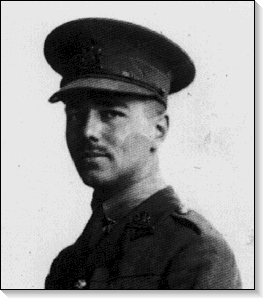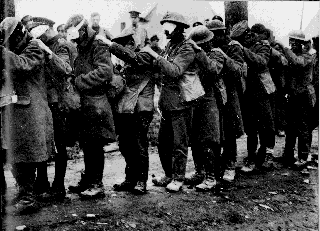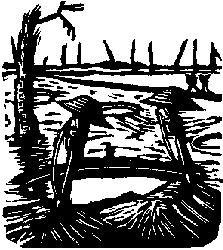

The uniform is British circa WWI. His name was Wilfred Owen. What has he to do with the U.S. holiday of Memorial Day? The experience of war knows no geographical indenties; all soldiers understand it the same at base value. While these poems may have a particularly heavy religious overtone, they are none-the-less a collection of the poetry of war.
Wilfred Owen was born March 18, 1893. Various biographies conflict in recounting his military career. It is generally agreed that he was teaching language arts in France at the outbreak of the war and that he returned to England to enlist and accept appointment as an officer in the Autumn of 1915. It is also generally accepted that his life ended on November 4, 1918, seven days before Armistice and the end of the war. The question his death leaves behind from a literary point-of-view is whether this--the poetry of war--were the only voice he had or whether, in peacetime, he should have created a much larger legacy. We shall never know.
Dulce Et Decorum Est
- Bent double, like old beggars under sacks
- Knock-kneed, coughing like hags, we cursed through sludge,
- Till on the haunting flares we turned out backs
- And towards our distant rest began to trudge.
- Men marched asleep. Many had lost their boots
- But limped on, blood-shod. All went lame; all blind;
- Drunk with fatigue; deaf even to the hoots
- Of tired, outstripped Five-Nines that dropped behind.
- Gas! GAS! Quick, boys!---An ecstasy of fumbling,
- Fitting the clumsy helmets just in time;
- But someone still was yelling out and stumbling
- And flound'ring like a man in fire or lime...
- Dim, through the misty panes and thick green light,
- As under a green sea, I saw him drowning.
- In all my dreams, before my helpless sight,
- He plunges at me, guttering, choking, drowning.
- If in some smothering dreams you too could pace
- Behind the wagon that we flung him in,
- And watch the white eyes writhing in his face,
- His hanging face, like a devil's sick of sin;
- If you could hear, at every jolt, the blood
- Come gargling from the froth-corrupted lungs,
- Obscene as cancer, bitter as the cud
- Of vile, incurable sores on innocent tongues,---
- my friend, you would not tell with such high zest
- To children ardent for some desperate glory,
- The old Lie: Dulce et decorum est
- Pro patria mori.
Futility
- Move him into the sun--
- Gently its touch awoke him once,
- At home, whispering of fields unsown.
- Always it woke him, even in France,
- Until this morning, and this snow.
- If anything might rouse him now
- The kind old sun will know.
- Think how it wakes the seeds--
- Woke, once, the clays of a cold star.
- Are limbs, so dear-achieved, are sides,
- Full-nerved--still warm--too hard to stir?
- Was it for this the clay grew tall?
- --O what made fatuous sunbeams toil
- To break the earth's sleep at all?
Anthem for Doomed Youth
- What passing-bells for these who die as cattle?
- Only the monstrous anger of the guns.
- Only the stuttering rifles' rapid rattle
- Can patter out their hasty orisons.
- No mockeries for them from prayers or bells,
- Nor any voice of mourning save the choirs--
- The shrill, demented choirs of wailing shells;
- And bugles calling for them from sad shires.
- What candles may be held to speed them all?
- Not in the hands of boys, but in their eyes
- Shall shine the holy glimmers of good-byes.
- The pallor of girls' brows shall be their pall;
- Their flowers the tenderness of patient minds,
- And each slow dusk a drawing-down of blinds.
Strange Meeting
- It seemed that out of battle I escaped
- Down some profound dull tunnel, long since scooped
- Through caverns which titanic wars had groined,
- Yet also there encumbered sleepers groaned,
- Too fast in sleep or death to be bestirred.
- Then, as I probed them, one sprang up, and stared
- With piteous recognition in fixed eyes,
- Lifting distressful hands as if to bless.
- And by his smile I knew that sullen hall.
- By his dead smile I knew we stood in Hell.
- With a thousand pains that vision's face was grained,
- Yet no blood reached there from the upper ground,
- And no guns whooped, or down the flues made moan.
- "Strange friend," I said, "here is no cause to mourn."
- "None," said the other, "save the undone years,
- The hopelessness. Whatever hope is yours
- Was my hope also; I went hunting wild
- After the wildest beauty in the world,
- Which lies not calm in eyes, or braided hair,
- But mocks the steady running of the hour,
- And if it grieves, grieves richlier than here.
- For of my glee might many men have laughed,
- And of my weeping something had been left
- Which must die now. I mean the truth untold:
- The pity of war, the pity war distilled.
- Now men will go content with what we spoiled,
- Or, discontent, boil bloody, and be spilled.
- They will be swift, with swiftness of the tigress.
- None will break ranks, though nations trek from progress.
- Courage was mine, and I had mystery;
- Wisdom was mine, and I had mastery
- To miss the march of this retreating world
- Into vain citadels that are not walled.
- Then, when much blood had clogged their chariots wheels,
- I would go up and wash them from sweet wells.
- Even with truths that lie too deep for taint
- I would have poured my spirit without stint.
- But not through wounds; not on the cess of war.
- Foreheads of men have bled where no wounds were.
- I am the enemy you killed, my friend.
- I knew you in this dark--for so you frowned
- Yesterday through me as you jabbed and killed.
- I parried, but my hands were loath and cold.
- Let us sleep now..."
Apologia Pro Poemate Meo
- I, too, saw God through mud--
- The mud that cracked on cheeks when wretches smiled.
- War brought more glory to their eyes than blood,
- And gave their laughs more glee than shakes a child.
- Merry it was to laugh there--
- Where death becomes absurd and life absurder.
- For power was on us as we slashed bones bare
- Not to feel sickness or remorse of murder.
- I, too, have dropped off fear--
- Behind the barrage, dead as my platoon,
- And sailed my spirit surging, light and clear,
- Past the entanglement where hopes lie strewn;
- And witnessed exhultation--
- Faces that used to curse me, scowl for scowl,
- Shine and lift up with passion of oblation,
- Seraphic for an hour, though they were foul.
- I have made fellowships--
- Untold of happy lovers in old song.
- For love is not the binding of fair lips
- With the soft silk of eyes that look and long.
- By joy, whose ribbon slips,--
- But wound with war's hard wire whose stakes are strong;
- Bound with the bandage of the arm that drips;
- Knit in the welding of the rifle-thong.
- I have perceived much beauty
- In the hoarse oaths that kept our courage straight;
- Heard music in the silentness of duty;
- Found peace where shell-storms spouted reddest spate.
- Nevertheless, except you share
- With them in hell the sorrowful dark of hell,
- Whose world is but a trembling of a flare
- And heaven but a highway for a shell,
- You shall not hear their mirth:
- You shall not come to think them well content
- By any jest of mine. These men are worth
- Your tears: You are not worth their merriment.
Greater Love
- Red lips are not so red
- As the stained stones kissed by the English dead.
- Kindness of wooed and wooer
- Seems shame to their love pure.
- O Love, your eyes lose lure
- When I beheld eyes blinded in my stead!
- Your slender attitude
- Trembles not exquisite like limbs knife-skewed,
- Rolling and rolling there
- Where God seems not to care;
- Till the fierce love they bear
- Cramps them in death's extreme decrepitude.
- Your voice sings not so soft,-
- Though even as wind murmuring through raftered loft,-
- Your dear voice is not dear,
- Gentle, and evening clear,
- As theirs whom none now hear,
- Now earth has stopped their piteous mouthes that coughed.
- Heart, you were never hot
- Nor large, nor full like hearts made great with shot;
- And though your hand be pale,
- Paler are all which trail
- Your cross through flame and hail:
- Weep, you may weep, for you may touch them not.
The Send-Off
- Down the close, darkening lanes they sang their way
- To the siding-shed,
- And lined the train with faces grimly gay.
- Their breasts were stuck all white with wreath and spray
- As men's are, dead.
- Dull porters watched them, and a casual tramp
- Stood staring hard,
- Sorry to miss them from the upland camp.
- Then, unmoved, signals nodded, and a lamp
- Winked to the guard.
- So secretly, like wrongs hushed-up, they went.
- They were not ours:
- We never heard to which front these were sent.
- Nor there if they yet mock what women meant
- Who gave them flowers.
- Shall they return to beatings of great bells
- In wild train-loads?
- A few, a few, too few for drums and yells,
- May creep back, silent, to still village wells
- Up half-known roads.
Spring Offensive
- Halted against the shade of a last hill,
- They fed, and lying easy, were at ease
- And, finding comfortable chests and knees,
- Carelessly slept. But many there stood still
- To face the stark, blank sky beyond the ridge,
- Knowing their feet had come to the end of the world.
- Marvelling they stood, and watched the long grass swirled
- By the May breeze, murmurous with wasp and midge,
- For though the summer oozed into their veins
- Like an injected drug for their bodies' pains,
- Sharp on their souls hung the imminent line of grass,
- Fearfully flashed the sky's mysterious glass.
- Hour after hour they ponder the warm field --
- And the far valley behind, where the buttercup
- Had blessed with gold their slow boots coming up,
- Where even the little brambles would not yield,
- But clutched and clung to them like sorrowing hands;
- They breathe like trees unstirred.
- Till like a cold gust thrills the little word
- At which each body and its soul begird
- And tighten them for battle. No alarms
- Of bugles, no high flags, no clamorous haste --
- Only a lift and flare of eyes that faced
- The sun, like a friend with whom their love is done.
- O larger shone that smile against the sun, --
- Mightier than his whose bounty these have spurned.
- So, soon they topped the hill, and raced together
- Over an open stretch of herb and heather
- Exposed. And instantly the whole sky burned
- With fury against them; earth set sudden cups
- In thousands for their blood; and the green slope
- Chasmed and steepened sheer to infinite space.
- * * *
- Of them who running on that last high place
- Leapt to swift unseen bullets, or went up
- On the host blast and fury of hell's upsurge,
- Or plunged and fell away past this world's verge,
- Some say God caught them even before they fell.
- But what say such as from existence' brink
- Ventured but drave too swift to sink,
- The few who rushed in the body to enter hell,
- And there out-fiending all its fiends and flames
- With superhuman inhumanities,
- Long-famous glories, immemorial shames --
- And crawling slowly back, have by degrees
- Regained cool peaceful air in wonder --
- Why speak not they of comrades that went under?
- The Poets' Corner Homepage
- Primary text source. One of the better sites for poetry and verse on the Internet. [http://www.oocities.org/~spanoudi/poems/index.html]
- "--the rest is silence."
- Lost Poets of the Great War. [http://www.emory.edu/ENGLISH/LostPoets/index.html].
- Wilfred Owen
- A sort of literary fan club for the poet. [http://mason.gmu.edu/~mhuynh/frame.html]
Notes: Much of the art and material used on this page was obtained and adapted from the sites named above.
This site is hosted byand is best viewed with


